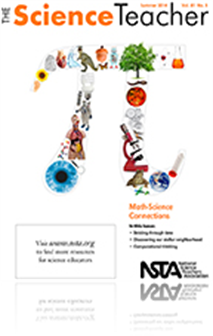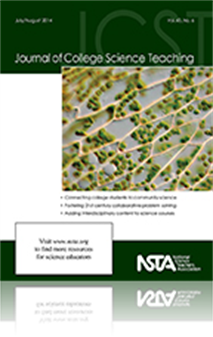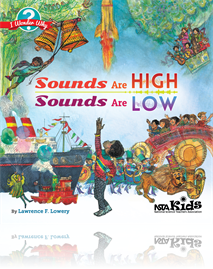All Resources
Journal Article
Safer Science: Accommodation and Laboratory Safety
This column provides best safety practices for the science classroom and laboratory. This month’s issue addresses maintaining a safer classroom environment while accommodating special needs students....
Journal Article
Career of the Month: An Interview With Biological Engineer Reshma Shetty
This column shares interviews with professionals using science in the workplace. This month’s issue describes Reshma Shetty's career path to becoming a biological engineer....
Journal Article
Twitter in the Higher Education Classroom: A Student and Faculty Assessment of Use and Perception
This article describes a study that assesses social media use and perception of utility in higher education classrooms among faculty, graduate, and undergraduate cohorts....
Journal Article
Beginning a Classroom Inquiry: Using Photovoice to Connect College Students to Community Science
In this article the process of photovoice is showcased as a platform for undergraduate students to connect to their local community through science while beginning to develop an inquiry project on environmental stability....
Journal Article
A Learner-Centered Molecular Modeling Exercise for Allied Health Majors in a Biochemistry Class
This article describes a learner-centered project given to allied health majors in a biochemistry course. The project involved building molecular models of imagined protein binding sites for the drug thalidomide....
Journal Article
General Chemistry II: Setting the Stage on the First Day With Jeopardy
This article describes using an interactive Jeopardy-type review for the first-class meeting as a means to engage students, review the previous semester content, and set expectations for the new semester of our general chemistry series....
Journal Article
This article describes the mobilization and implementation of a community-oriented Interdisciplinary Science Seminar (ISS) that adds interdisciplinary content to traditional introductory science courses without a significant investment of additional ...
Journal Article
Applying the Brakes: How Practical Classroom Decisions Affect the Adoption of Inquiry Instruction
The study described in this article involved 13 community college biology instructors as they adopted bioinformatics problem-based learning modules in their classroom. The study used a diffusion of an innovation theoretical framework and a systematic...
Journal Article
The focus of this article is primarily on the success of a semester in which students were invited by the director of the campus library to specifically address, and make recommendations to mitigate, the carbon footprint of the library....
Journal Article
The Journal of College Science Teaching’s editor shares thoughts regarding the current issue....
Journal Article
This article presents a comparison of the success rates of different teaching methods for students enrolled in a general biology course with laboratory for majors in a community college....
Journal Article
Case Study: From Gummy Bears to Celery Stalks: Diffusion and Osmosis
This column provides original articles on innovations in case study teaching, assessment of the method, as well as case studies with teaching notes. This month’s issue covers diffusion and osmosis....
Journal Article
This article describes the DEEPER framework for scaffolding collaborative problem solving that was designed to address the student outcomes outlined by the Partnership for 21st Century Skills....
Journal Article
This article looks at a potential factor for the existence of a research-practice gap in science instruction in higher education: instructors' access to research-based instructional materials....
Book Chapter
Rubber vs. Glass: I Wonder Why sample
In this sample from Rubber vs. Glass: I Wonder Why you will explore the properties of rubber vs. glass and will discover that different objects have special and useful properties. ...
Book Chapter
Light and Color: I Wonder Why sample
This sample from Light and Color: I Wonder Why unfolds observations about light, interaction with the properties of light, and the effect of light on objects. By reading this sample, you’ll discover what we mean when we say the colors of a rainbow...
Book Chapter
Sounds Are High, Sounds Are Low: I Wonder Why (Book Sample)
This sample from Sounds Are High, Sounds Are Low: I Wonder Why presents the nature of waves and sound with humorous proof in poetry of just how fun it is to observe with your ears. It’s ideal for beginning readers and hilarious practice for future...
Book Chapter
Michael's Racing Machine: I Wonder Why sample
This sample from Michael’s Racing Machine: I Wonder Why illustrates the use of simple machines to accomplish work. It provides an easy-to-understand lesson in how simple machines are all around us, making work more efficient. You will learn that a ...
Book Chapter
Dark as a Shadow: I Wonder Why sample
This sample from Dark as a Shadow: I Wonder Why is written in lively rhymes, making it fun to learn the science behind why shadows change length through the day and disappear in the dark. Kids will learn to twist and bend or wiggle and shake, to see...
Book Chapter
Next Time You See The Moon sample
This sample chapter from Next Time You See The Moon focuses on the Moon's changing shapes and the many phases of the Moon. If you keep track of the Moon phases for a while, you will discover that it takes about a month to observe all of the Moon phas...
eBook
Sounds Are High, Sounds Are Low: I Wonder Why (e-book)
Here’s humorous proof of just how fun it is to observe with your ears. A whimsical introduction to pitch and volume, this book practically begs young scientists to read it aloud. And why not? It’s the best way to compare the differences among a t...











